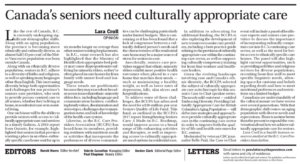By Lara Croll
Like the rest of Canada, B.C. is currently undergoing significant demographic shifts. Along with an aging population, the province is becoming more ethnically and culturally diverse, as almost half (45 per cent) of the Metro Vancouver population was born outside Canada.

Along with an ethnically diverse population, seniors in B.C. adhere to a diversity of faiths and religions, as well as speaking many languages other than English. This increasing diversity brings both opportunities and challenges for our province’s seniors-care providers, who seek to provide person-centred care to all seniors, whether they’re living at home, in residential care or in assisted living.
One such issue will be the ability to provide seniors with access to culturally appropriate care and services in a timely fashion. A 2016 report from Ontario, for example, highlighted the fact that seniors in that province wanting a place in an ethno-culturally specific care home wait for up to six months longer on average than other seniors waiting for placement.
In B.C., some research has also highlighted that the Ministry of Health’s First Appropriate Bed Policy may cause disproportionate suffering for minority elders, as they’re often placed in care homes far from family, with unmet food and language needs.
These trends are problematic because they may exacerbate broader access issues that ethnic-minority elders face, including language and communication barriers, conflicting family values, discrimination and stereotypes, challenges due to immigration status, and lack of knowledge of the health-care system.

Likewise, as the B.C. Care Providers Association (BCCPA) has heard from its members, providing residents with nutritious meals or activities that incorporate the preferences of diverse communities can be challenging particularly under limited budgets. This is concerning as it has been found that a lack of congruence between a culturally defined person’s needs and the characteristics of the residential care home may be a major source of stress for seniors in care.
Anecdotally, seniors-care providers suggest that ethnic-minority elders exhibit more positive health outcomes when placed in a care home that matches their needs — such as maintaining a healthy weight, as well as lower rates of depression, falls, skin ulcers and hospitalizations.
To address some of these challenges, the BCCPA has advocated the need for a $30-million-per-year Seniors Quality of Life Fund. This fund, as outlined in the BCCPA’s 2017 report Strengthening Seniors Care: A Made-in-B.C. Roadmap, would improve access to a broad range of life-enhancing activities and therapies, as well as improving access to culturally appropriate meal options in residential care.
In addition to advocating for additional funding, the BCCPA is also exploring the development of new resources to assist care-providers, including a best-practice guide relating to the provision of culturally appropriate care within the continuing-care sector, as well as supporting culturally competency training for front-line workers and health-care leaders.
Given the evolving landscape involving care and Canada’s ethnic diversity, the BCCPA selected the subject of culturally appropriate care as its first topic for this season’s Care to Chat speaker series. The nearly sold-out event — entitled Embracing Diversity: Providing Culturally Appropriate Care for British Columbia’s Aging Population — will delve into strategies and approaches to provide culturally appropriate care in the continuing-care sector, in order to improve both the quality of life and health outcomes for B.C. seniors.
Moderated by veteran CBC journalist Belle Puri, the Care to Chat event will include a panel of health-care experts and seniors’ care-providers to discuss the importance of incorporating culturally competent care into B.C.’s continuing-care sector, as well as the need for better access to ethnically specific care homes. The panel will also highlight current opportunities, such as providing activities and religious services for diverse populations, recruiting front-line staff to meet specific linguistic needs, allowing space for customs and beliefs regarding death, and how to meet nutritional preferences and restrictions on a limited budget.
Canadians are understandably of the cultural mosaic we have woven over several generations. With that demographic shift comes an aging population with diverse needs and expectations. There is no time better than the present to expand the conversation about how we achieve culturally appropriate care for seniors.
Lara Croll is B.C. Care Providers Association’s health human-resources analyst. This op-ed was originally featured in The Province newspaper, Oct. 2nd 2017




